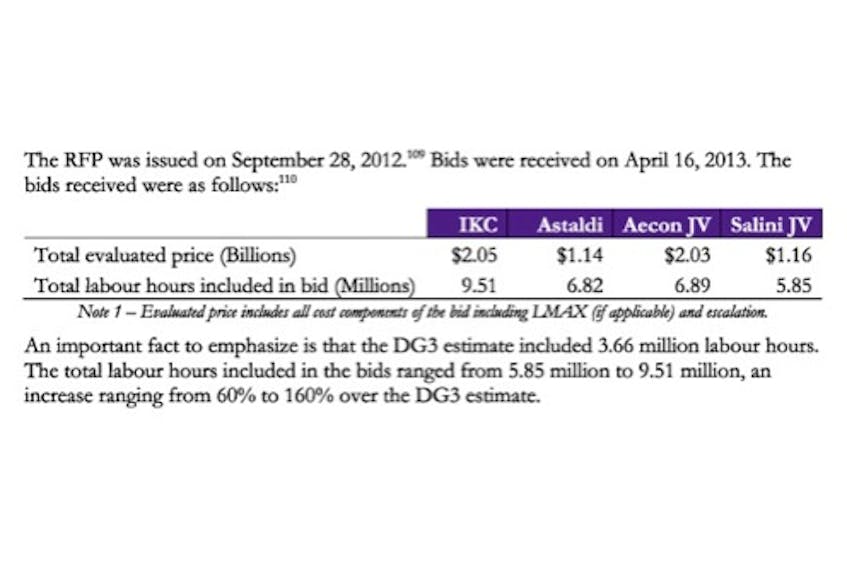Nalcor Energy and Astaldi Canada are fighting over Muskrat Falls project costs in the courts, but at the Muskrat Falls Inquiry on Wednesday, Nalcor Energy lawyer Dan Simmons defended the original decision to work with the Italian company.
Simmons had an opportunity to question auditor Scott Shaffer of Grant Thornton, who was on the stand throughout the day. Shaffer was taking questions on the recorded jumps in Muskrat Falls project costs.
Shaffer reported to the inquiry on the awarding of construction of the Muskrat Falls intake, powerhouse, spillway and transition dams to Astaldi Canada, over three other bidders. The auditor’s report states, regardless of the bidder, low prices were given great weight scoring for the final contractor selections, above scoring for ability to do the work as proposed (all other things being equal, 63 per cent of the total scoring in bid assessments would favour the lowest-cost bidder).
“I regard that basically ‘low bid wins’ is unusual,” Shaffer told lawyer Geoff Budden (for the Concerned Citizens Coalition) later in the day, in describing the issue as he saw it, while noting the large gap in prices in bids for the Muskrat Falls contract package.
The contracts with Astaldi Canada were signed in November 2013. That package now accounts for more than 30 per cent of overruns on the hydroelectric project.
On behalf of Nalcor Energy, Simmons walked through the original bid evaluation process, looking back to the pre-qualification rounds. Then, he ventured down the road of “what if.”

What if Astaldi wasn’t the contractor Nalcor Energy was now scrapping with over costs? Should the work have gone to another contractor? What about Salini S.p.A., and its proposed joint venture with FCC Construction S.A. and Impregila S.p.A.?
“If the Astaldi bid had not been accepted, I’m presuming you would have had the same concern about the Salini bid, because it was for the same price and for fewer labour hours than Astaldi anticipated using?” Simmons asked.
“I would have,” Shaffer replied, as Commissioner Richard LeBlanc and a pack of lawyers looked on.
“So I presume that if neither of those were accepted it would have been either the IKC bid or the Aecon bid that would have had to have been accepted for the project,” Simmons said.
“I would assume so,” Shaffer said.
“And based on the numbers that they have bid, right from the start the contract price would have been $800 million-$900 million more than it was for Astaldi,” Simmons said.
“In all likelihood. Yes,” Shaffer said.
At that point, Simmons took Shaffer through changes he documented in the Astaldi contract and roughly $900 million in additional payments. “Which is really the same if the contract had been awarded to IKC or Aecon in the first place,” the lawyer suggested.
Shaffer reluctantly agreed, with the caveat that changes in the project schedule tied to Astaldi’s work had knock-on effects – contributing to cost elsewhere in the project.
But Simmons went a step further, noting there could have easily also been additional costs associated with another contractor’s work at Muskrat Falls, if they were selected, above and beyond what was bid.
“Potentially,” Shaffer said.
Astaldi Canada was ultimately ordered off the site by Nalcor Energy in October 2018.
The auditor’s report also offered a critical note on a perceived lag time between when problems were first recorded with Astaldi’s completion rate and when a formal assessment was undertaken by Nalcor Energy.
Shaffer said it had been clear to the project team by mid 2015 that Astaldi’s work was costing significantly more than expected. Nalcor Energy had Westney Consulting look at it, and the consultant reported in February 2016 that negotiating with Astaldi on new costs, instead of changing contractors, would provide less “cost-risk exposure” to the project.
A “bridge agreement,” wherein Nalcor agreed to pay the contractor more money, was settled. It allowed enough time to negotiate a “completion contract” before the end of 2016, amounting to more money again from Nalcor to see the work completed. There have been further increases in cost since, before the contractor’s firing, with the auditor bringing the update to late March 2018 and a total of $1.96 billion committed to the Astaldi agreements.
“There’s no doubt there’s going to be costs, there’s no doubt there’s going to be premiums, my only question here is could that analysis have been done sooner?” Shaffer said.
A lawyer representing Astaldi at the inquiry will have an opportunity to question Shaffer on Thursday.
RELATED









